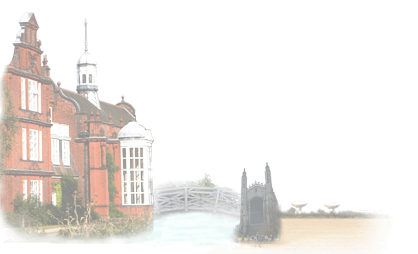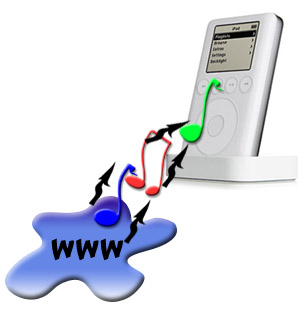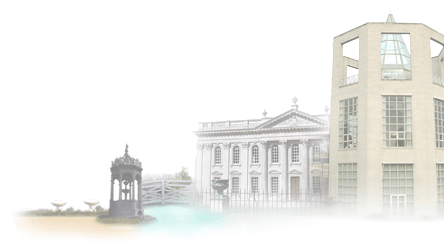A Cambridge perspective
on the digital world



May 2003
Once upon a time, the only way to hear music was to hire a musician, or play
it yourself. Music recording changed all that, created the multi-billion-dollar
recording industry we know today, and launched the careers of a thousand rock
stars.
But music is now going through its biggest change since the invention of the gramaphone - a change that affects every aspect of the way music is created, recorded, distributed, and listened to.
Once, music was distributed on a physical disc which we paid to own (CD, vinyl, or 78 - the concept was the same). Now we will pay for permission to download a pattern of bits that play on a computer or a portable device. The latest hi fi equipment owes as much to computer technology as it does to traditional audio design. The modern version of the Walkman - devices such as Apple's iPod - is in all essential respects a computer, though it is no bigger than a pack of cards.
For some time, the music industry has wrestled with the conflict between what is now possible (download and distribution of music files via the Internet - files which can then be loaded directly onto devices such as the iPod) and what is legal. Millions of people have become used to getting their music, free of charge, from the Net, rather than buying it from a record store.
But what is possible can now be done with a clear conscience. Launched 28 April, Apple's Music Store service charges 99 cents for download of a track that you can play on your Macintosh computer, burn onto your own CD, or copy to your iPod portable player. A version for Windows will be available shortly.
 Apple's
is the most high profile launch so far among a range of similar services -
and judging from the success of the iPod, it is the one likely to have most
impact. Reports suggest that Apple's service had 275,000 downloads in the
first 18 hours, despite the fact that the service is only available at present
to owners of Macintosh computers.
Apple's
is the most high profile launch so far among a range of similar services -
and judging from the success of the iPod, it is the one likely to have most
impact. Reports suggest that Apple's service had 275,000 downloads in the
first 18 hours, despite the fact that the service is only available at present
to owners of Macintosh computers.
It was the development of the MP3 music file format that let the cat out the bag, and launched file-swapping company Napster and others. For those in the know, exchange of music files via the Net had been possible for some time; MP3 and Napster made it a daily pastime for millions. Napster users could share files, for free, with thousands of others via the Internet.
Napster was a stick of dynamite placed in the economic foundations of the recording industry. Why should people pay for music if they could find anything they wanted free on the Net? There was no doubt about the demand: within a few short months, Napster gained 50 million users.
Legal challenges from the recording industry eventually crushed Napster. But no legal effort could change the fact that millions of people now have, in their own homes, all the technology needed to process, store, copy and exchange - without any loss of quality - all the music they will ever need. An ordinary PC will do it.
After Napster, it was only a matter of time before someone found the right formula to persuade copyright owners to deal, and set up a legal form of distribution. Steve Jobs, the charismatic leader of Apple, appears to have done it: Apple now has agreements with all five major recording companies: BMG, EMI, Sony Music, Universal and Warner Music. Apple also has a global population of iPod users: iPod has outsold all other similar devices. At one time Apple was even reported to be in talks to buy Universal. Whether or not this happens, Apple is now a major force in the music industry worldwide.
 It's
All Software Now
It's
All Software NowApple's Music Store is the clearest sign yet of a trend that has been developing for the past decade, and more. Music, along with all other forms of information, is now software, just as much as computer programs are. All are patterns of bits, and all can now be copied and distributed, without loss of quality and with extreme ease.
Companies used to dealing with software understand both the problems and the potential of dealing with information in this highly volatile form. This is a very different business from the distribution of information on physical discs, or other media. It can be extremely profitable (witness Microsoft), but it carries new kinds of risk for the unwary. Like it or not, more and more companies are going to be in the software business.
Does this matter to anyone outside the music industry? Yes, because the Napster-reality of how easy it now is to copy and distribute digital files applies not just to music, but to all information. The structural changes now affecting the music business will be faced, sooner or later, by every industry that deals with and processes information as part of its business. Like Apple, whoever gets the formula right, and finds the right way to bridge the commercial gap between those who produce and those who consume information, will become a major force overnight. They may also change the structure of their industry forever.
What is happening to the music business is a pointer to the future for everyone. In the end, all industries will have to deal with this, because economic and technical realities cannot be ignored for long.
How is your industry dealing with the challenge of 'soft' information?
